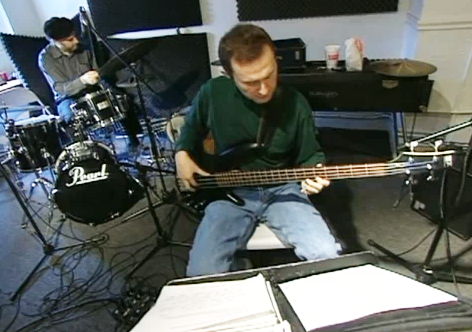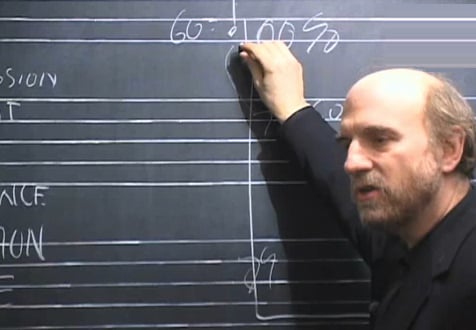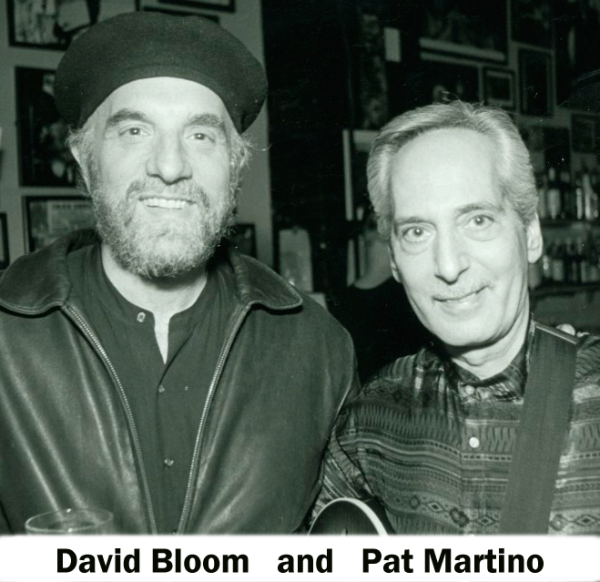Consider these five things when choosing a jazz school:
1. What you expect to get out of it? Do you want to be a jazz artist, a band director, and teacher or just want to learn without any economic benefit?
2. What is your relationship with jazz? How many hours a week do you: listen to the masters, practice effectively by yourself, play with others and just think about jazz? What have you done to demonstrate your love for jazz? What do you think a jazz school will do for your career?
Jazz School News, Thoughts and Events.
Topics: jazz school, music school, jazz schools, music schools
If you live far from Chicago, and would like greatly improve your musical knowledge and expression this summer, you can! The Bloom School of Jazz now offers live Skype Video 1-on-1 classes from Chicago (you can be anywhere in the world!). Get the full benefit of a real private session, in the comfort of your own home. The assignments are the same, the curriculum is the same, and the philosophy is the same - and you never have to leave your home practice space. Technology can make learning jazz quite convenient!
To set up an appointment, begin by requesting to share contact details with bloomschooljazz on Skype (note the "of" is not included!). We will then contact you shortly about setting up an orientation video chat!
Even better, Skype is FREE to use. If you don't have a copy, simply choose what kind of computer to the right, follow the link, and download it today.
Topics: jazz programs, jazz school, jazz education, online jazz lessons, live online jazz
Jazz School Experience Series: Escaping Yourself to Be You Part 4
Posted by David Bloom on Apr 27, 2011 3:45:00 PM
Escaping Yourself to Be You (Part 4)
For civilians and musicians alike, I suggest a one week test: turn off the TV and computer games, use the phone only when it's necessary, and spend the rest of the time doing things that make you think, feel, emote, create or anything that shows an active involvement and appreciation of you life. In one year the average person watches about 1200 hours of TV. Think of what could be learned in 1200 hours in one year. One could become competent in an instrument, learn a language, learn a sport, and take courses or whatever. It's staggering. No one has ever felt or developed pride by watching TV.
Topics: david bloom, jazz classes, jazz school, jazz schools, inspiration
Jazz School Experience Series: Escaping Yourself to Be You Part 3
Posted by David Bloom on Apr 20, 2011 6:06:00 PM
Escaping Yourself to Be You (Part 3)
A few specific ideas for musicians as well as civilians to help you escape both the outside and inside negative forces are as follows: For musicians, I have found that a good way to work on escaping preconceived notions, and occupying the present is to play the first two bars of the melody of a ballad twenty times, each phrasing the melody differently, but in a way that is sincere and expressive. They rhythm can be changed, the melody can be broken up differently with different length rests and dramatic dynamics can be used. But do not change the actual pitches; once you change the pitches and the rhythm it is no longer the tune that is was to begin with.
Topics: jazz courses, jazz classes, jazz school, jazz education
Jazz School Experience Series: Escaping Yourself to Be You Part 2
Posted by David Bloom on Feb 5, 2011 9:55:00 AM
Escaping Yourself to Be You (Part 2)
I had a student named Joseph who had already played with numerous national stars when he first came in for an evaluation. During our first meeting he played only fast notes. It was clear to me that he had spent a lot of time on technique and was an accomplished guitarist but not a strong musician. His self-conscious desire to impress was greater than his desire to express. In his first exercise with me, he was forbidden from playing flurries of fast notes. This restrictive demand was the best thing that could have happened to him. Over time he discovered his individual expression, sense of lyricism and learned that technique must always serve an expressive idea.
Another student, Bob, was an excellent example of the converse. When he walked into the school the first time he had very poorly developed physical dexterity but as I listened to him, he revealed a selflessness and intuition for musical direction and expression. The last thing on his mind was that I was in the room. He had given in to the music and there was nothing to prove. The music had eclipsed his ego.
Self-consciousness on the bandstand can be heard, and can easily be noticed when the player is looking around the room to see if anyone is watching them while they are playing. They are taking "affirmation inventory" as they play; checking out who likes them or who looks impressed with them. Another example of self-consciousness occurs when a musician plays a barrage of undirected notes that communicate that they have no reason to be played other than to demonstrate to the audience that the player has Olympian technique and is "bad" (meaning dangerous). Hiding ones vulnerability with this desperate and cynical approach gives jazz a bad name. These musicians seem to give in to their worst feelings about themselves, which is, that they can't be appreciated for being themselves and have to put on a dog and pony show to elicit a favorable response.
Great jazz players teach you an appreciation of what you have inside you and what you love. Conforming to conventions, attitudes and behaviors is only about what other people think and do. Discipline, focus, sacrifice and heart are the tools used to respect your own life and to conquer your demons.
Topics: chicago jazz, jazz programs, jazz classes, jazz school
Jazz School Experience Series: Escaping Yourself to Be You Part 1
Posted by David Bloom on Jan 24, 2011 8:11:00 PM
Escaping Yourself to Be You (Part 1)
We live in a culture where people go to the Caymans, play Nintendo, watch TV, take drugs, booze and engage in a host of other activities in order to escape negative aspects of their life. "Getting away" is a mantra that we hear regularly from fed-up folks, who can't stand their boss, mate, relatives or whatever. When they go on vacation they feel they are being released from prison. Some people who aren't just escaping from external things, but also from bewilderment, alienation, depression and low self-esteem, think that if they change their immediate state of mind or environment they will feel better. Escaping away from something dark and debilitating can never compare with moving towards something positive. In other words, the absence of a negative force is not a positive one; it's neutral.
Jazz musicians need to escape many of the same problems, but also encounter some different ones. They have to escape from the clutches of conformity and self-consciousness, which is mandatory in jazz. It is very easy for jazz players and civilians (non-musicians) to be wooed by the allure, the promise and scale of manipulative media in order to feel like they are more sexy, more powerful, rebellious, and not left outside. But losing or attenuating one's birthright because of the external influence is not part of the jazz personality.
Great jazz players know that all they have is themselves: pure, undiluted and uncorrupted. Doing what everyone else is doing is not an option in their world. They have never made any Faustian agreements about their music and treat their talents with great respect. The average jazz player's main focus is to conform to and imitate what great jazz musicians have played. They think that if they play Coltrane's ideas then maybe they will become hip or famous too. In the jazz community you don't get significant points for merely copying Coltrane's solo. Entry into the pantheon of great jazz is strictly reserved for those who play "who they are," not for those who second-guess what they think the audience wants to hear. The jazz masters all know that individuality can't be mass-produced.
Topics: jazz courses, chicago jazz, david bloom, jazz school, jazz instruction
In America, people who get A’s are smart, disciplined, and will help to enlighten society. And people who get F’s are stupid, uncreative, and probably will have no effect on society. Right?
Topics: j, chicago jazz, jazz programs, jazz school, potential
Listening, on the other hand, is a matter of choice. If you are talking with someone you have the option of just hearing the sounds while you think your own thoughts or actually listening to what you are hearing. To listen means that you are carefully considering everything that is being said and responding to it.
If you are a musician and you are only hearing what others are playing without listening, the results will be chaotic. The dynamics won't match, some notes will be inappropriately louder or softer than the others, the timing will not be in synch, and other problems will occur. In affect, you will not be playing with others, you will only be playing simultaneously as others play.
The potential for musical or social intimacy becomes possible when you listen to others, and impossible when you don't. A bad band sounds like they are playing in the same building but not in the same room.
In a great jazz band, everything that is played is listened to deeply in order to assess the inspirational and navigational value. While the sax player is soloing, the drummer, piano player, and bassist have many response options. They may imitate, play against or just play time without any dramatic response. When musicians listen at this deep level they are opening up access to the moment, talking musically with each other as new ideas occur.
Nothing of value can happen between musicians (or civilians) without listening, a mandatory prerequisite for successful intimate human interaction.
Topics: jazz courses, chicago jazz, practicing music, jazz school, bloom school
What I realized years later is that all of us need that 16 square feet. It's a place where we are somebody, where what we think is important, not to just us, but to anyone on our turf - a place where we can feel like we can have power to refuse or to allow, where we can call the shots. Anyone, regardless of his or her station in life, must pass through our gate. It’s a world we can call our own.
Many of us have a space somewhere. It might be at home, at work, a health club, the bandstand, the stage, box seats or wherever. All of these locations may help you feel there is somewhere that makes you feel special, noticed, powerful and important.
There is only one location where you can guarantee to find that 16 square feet, and that is in your mind. That territory no one can take away - it's yours alone. It can be as expansive as 1000 miles or as small as a square inch. It's only limited by the depth of our imagination.
Whether it’s a physical 16 square feet or in your mind, it’s how you feel about it that’s important. It’s all up to you.
Topics: chicago jazz, david bloom, jazz school, inspiration
To me, he is the cleanest guitarist playing today. Although his playing may be a little predictable to those of us who have heard him before, his unrelenting attack and articulation, beautiful sound and fabulous time are exclusive to him.
This was an experience that confirms the power of jazz when it's played at the highest level. His music comes from a deep respect for the legacy and history of jazz, and like all the greatest players, he has developed his own instantly and delightfully recognizable voice.
Topics: david bloom, jazz school, bloom school, pat martino








